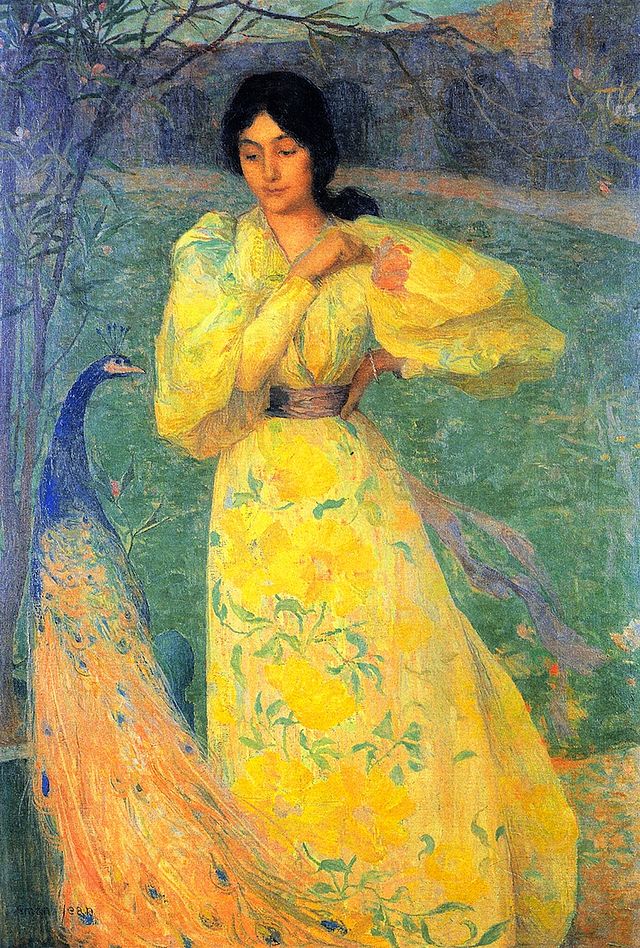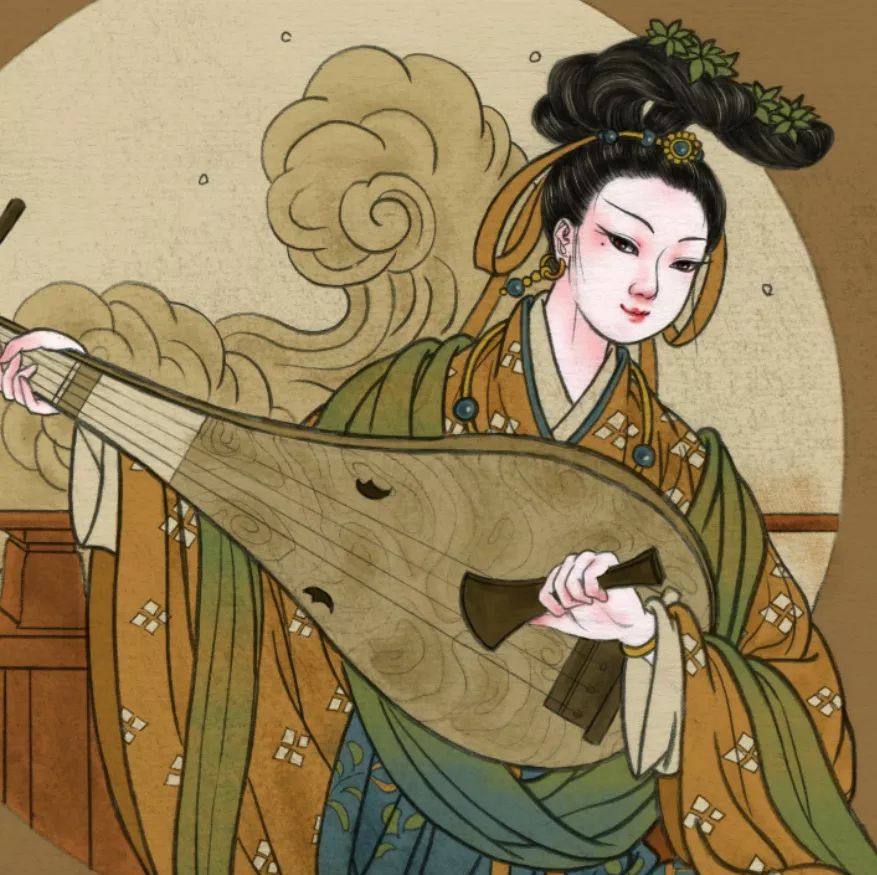Kind und Pfau
Girl And Peacock
Erich Mühsam (1878-1934)
Girl And Peacock
Im Mäntelchen mit viel Besatz
und seidener Kapotte,
im Spitzenkragen und Seidenlatz,
so steht hier die Charlotte.
Da kommt daher ein stolzer Pfau,
mit Federn, vielen hundert,
der sieht die kleine Menschenfrau, -
und beide steh'n verwundert.
Die Lotte beugt sich staunend vor,
der Pfau beugt sich zurücke
und spreizt den blauen Federflor; -
so kreuzen sich die Blicke.
"Was ist das für ein schönes Tier!"
so denken alle beide.
Er deucht ihr ganz von Golde schier,
sie deucht ihm ganz von Seide.
- Sie seh'n sich fast die Augen blind
am Kleid und an den Daunen -
und wenn sie nicht gegangen sind,
steh'n sie wohl noch und staunen.
Kind und Pfau
In pretty coat with silken hood
and braids and trimmings fancy
and pointed collar, there she stood,
the small, silk-swaddled Nancy.
A splendid peacock chanced to pass
with feathers, several hundred,
and saw the little human lass.
Both stood and gaped, and wondered:
Nancy leant forward in surprise,
the lovely bird leant backward:
the two could not believe their eyes!
Their postures were quite awkward.
He spread his azure feather-fan.
Reciprocally gazing,
each marvelled: What’s this creature, then!
How lovely, how amazing!
He thought: She’s silk! She thought: He’s gold!
The garb, the plumes perceiving,
it’s possible they’re still on hold,
immobile, disbelieving!
Translation: Copyright © Timothy Adès
More poems by Erich Mühsam...
I will go high up
Ich will alleine...
Erich Mühsam (1878-1934)
Ich will alleine...
Ich will alleine über die Berge gehn,
und keiner soll von meinen Wegen wissen;
denn wer den Pfad zu meinen Höhn gesehn,
hat mich von meinen Höhn herabgerissen.
Ich will alleine über die Berge gehn,
mein Lied soll ungehört am Fels verklingen,
und meine Klage soll im Wind verwehn; –
nur wer dem eignen Herzen singt, kann singen; –
nur wer dem eigenen Herzen klagt, kann klagen;
nur wer das eigne Herz erkennt, kann sehn. –
Hinauf zu mir! Ich will der Welt entsagen,
und will alleine über die Berge gehn.
I will go high up
I will go high up among the hills, alone,
And there is nobody who shall know my ways.
All who have seen the path to my lofty place,
They from my prominences have torn me down.
I will go high up among the hills, alone.
My song shall fade on the crag, none listening,
And lost on the wind shall be my piteous groan:
Only you who sing to your very own heart can sing.
Only you who groan to your very own heart can groan.
Only you who know your very own heart can see.
Come join me, I turn from the world’s malignity,
I will go high up among the hills, alone.
Translation: Copyright © Timothy Adès
More poems by Erich Mühsam...
I am afraid
Angst packt mich an
Erich Mühsam (1878-1934)
Angst packt mich an
Angst packt mich an,
Denn ich ahne, es nahen Tage
voll großer Klage.
Komm du, komm her zu mir! –
Wenn die Blätter im Herbst ersterben
und sich die Flüsse trüber färben
und sich die Wolken ineinander schieben –
dann komm, du, komm!
Schütze mich –
stütze mich –
fass meine Hand an.
Hilf mir lieben!
I am afraid
I am afraid, I’m gripped by fear.
I sense a time of laments is near.
Come with great love, come to me here!
When leaves in autumn fail and fade
When streams show off a sadder shade
When clouds in close crowds shift and shove –
Then come! Come with great love!
Escorting
Supporting
Grip my hand –
Help me to love!
Translation: Copyright © Timothy Adès
More poems by Erich Mühsam...
Evening
Der Abend
Camill Hoffmann (1878-1944)
Der Abend
Der Abend spannt sein Schattenzelt
Unmerklich in die Welt.
Der Mond schwebt auf, der Baum geht leis,
Das Haus steht leuchtend weis.
Das Haus, der Mond, der Ahornbaum
Sind alle nun ein Traum.
Evening
Evening comes, reticent,
Spreads on the world its shadow-tent.
Moon climbs, tree withdraws,
House remains, shining, wise.
Oak-tree, house, moonbeam,
All are now a dream.
Translation: Copyright © Timothy Adès
More poems by Camill Hoffmann...
So many nights have hung star-laden, full
Nach all den Nächten, die voll Sternen hingen
Erich Mühsam (1878-1934)
Nach all den Nächten, die voll Sternen hingen
Nach all den Nächten, die voll Sternen hingen,
nun diese dumpfe, trübe, nasse Nacht,
als wär die Arbeit aller Zeit vollbracht
und niemals wieder Hoffnung auf Gelingen.
Wohin die Schritte weisen, da das Ziel
ertrank im nebeligen Grau der Wege?
Ich such nur noch, wo ich mich niederlege,
den stillen Platz. Verloren ist das Spiel.
Ich höre vieler Menschen Schritte tasten –
verirrte Menschen, einsam, müd und arm –
und keiner weiß, wie wohl ihm wär und warm,
wenn wir einander bei den Händen faßten.
So many nights have hung star-laden, full
So many nights have hung star-laden, full:
And now this night, damp, sorrowful, and dull,
as if the whole of Time’s worked out its toil
and we have no more hope of doing well.
Where are the footsteps headed? What’s their aim?
In trails of murky grey they’re drowned and dead.
I only seek where I can lay my head,
a tranquil resting-place. We’ve lost the game.
I heard their groping steps, the hopeless band
Lost and bewildered, weary, lonely, poor:
none of them knows the warmth that we could share
if we just grasped each other by the hand.
Translation: Copyright © Timothy Adès
More poems by Erich Mühsam...
Butterfly in the Wine
Falter im Wein
Hermann Hesse (1877-1962)
Falter im Wein
In meinen Becher mit Wein ist ein Falter geflogen,
Trunken ergibt er sich seinem süssen Verderben,
Rudert erlahmend im Naß und ist willig zu sterben;
Endlich hat ihn mein Finger herausgezogen.
So ist mein Herz, von deinen Augen verblendet,
Selig im duftenden Becher der Liebe versunken,
Willig zu sterben, vom Wein deines Zaubers betrunken,
Wenn nicht ein Wink deiner Hand mein Schicksal vollendet.
Butterfly in the Wine
Into my wine-glass a butterfly flew.
Dazed, he submits to the sweet by-and-by,
Flailing, and failing, and willing to die;
Whom from his doom on my finger I drew.
You with your bright eyes bedazzled my seeing,
Deep in love’s nectar-bowl blissfully sunken,
Willingly doomed, with your wine-magic drunken,
Had not your hand set the seal on my being.
Translation: Copyright © Timothy Adès
More poems by Hermann Hesse...
Love-song
Liebeslied
Hermann Hesse (1877-1962)
Liebeslied
Betty, schöne Kellnerin,
Lach nicht so gemein!
Du sollst meine Königin
Und mein Engel sein.
Ach, du weisst nicht, wie ich litt,
Als mit Worten und mit Gesten
Du mir ferneren Kredit
Weigertest vor allen Gästen!
Wenn du heut nicht reagierst,
Ja dich strenger zeigst und kälter,
Wisse, dass du dann verlierst
Deinen Freund und deine Gelder!
Love-song
Betty pretty bar-girl
Oh your laugh is mean
You should be my angel
You should be my queen.
You were hurtful heedless
Waved your arms and said it
Heard by all the regulars
You cut off my credit.
If you’re stern and frozen
If you don’t relent
You are going to lose one
Friend and every cent.
Translation: Copyright © Timothy Adès
More poems by Hermann Hesse...
To a Chinese Singing-Woman
An eine chinesische Sängerin
Hermann Hesse (1877-1962)
An eine chinesische Sängerin
Auf dem stillen Flusse sind wir am Abend gefahren,
Rosig stand und beglänzt der Akazienbaum,
Rosig strahlten die Wolken. Ich aver sah sie kaum,
Sah nur die Pflaumenblüte in deinen Haaren.
Lächelnd saßest du vorn im geschmückten Boote,
Hieltest die Laute in der geübten Hand,
Sangest das Lied vom heiligen Vaterland,
Während in deinen Augen die Jugend lohte.
Schweigend stand ich am Mast und wünschte mir, ohne Ende
Dieser glühenden Augen Sklave zu sein,
Ewig dem Liede zu lauschen in seliger Pein
Und dem beglückenden Spiel deiner blumenhaft zarten Hände
To a Chinese Singing-Woman
We went at evening on the quiet river.
Rosy-pink glittered the acacia-tree,
Rosy-pink shone the clouds. But not for me:
I saw just your hair, and in it the damson-flower.
Smiling you sat at the prow of our boat adorned,
Holding the lute in your proficient hand,
Singing a song of your happy motherland,
While youth in your bright eyes burned.
Silent I stood at the mast, and wished for ever
I could be the slave of your glowing glance,
Hark to the song in ecstatic pain for ever,
And the entrancing play of those petals, your hands.
Translation: Copyright © Timothy Adès
More poems by Hermann Hesse...
Sometimes
Manchmal
Hermann Hesse (1877-1962)
Manchmal
Manchmal, wenn ein Vogel ruft
oder ein Wind geht in den Zweigen
oder ein Hund bellt im fernsten Gehöft,
dann muss ich lange lauschen und schweigen.
Meine Seele flieht zurück,
bis wo vor tausend vergessenen Jahren
der Vogel und der wehende Wind
mir ähnlich und meine Brüder waren.
Meine Seele wird Baum
und ein Tier und ein Wolkenweben.
Verwandelt und fremd kehrt sie zurück
und fragt mich. Wie soll ich Antwort geben?
Sometimes
Sometimes to a singing bird
Or a dog far away barking
Or to wind in treetops heard,
I must listen long, unspeaking.
And then my soul flees
Back a thousand forgotten years
When the bird and sighing breeze
Were mes semblables, mes frères.
My soul becomes a tree,
An animal, cloud in sky:
Transformed, it returns to me,
Questions me. How to reply?
Translation: Copyright © Timothy Adès
More poems by Hermann Hesse...
Happiness
Glück
Hermann Hesse (1877-1962)
Glück
Solang du nach dem Glücke jagst,
Bist du nicht reif zum Glücklichsein,
Und wäre alles Liebste dein.
Solang du um Verlornes klagst
Und Ziele hast und rastlos bist,
Weißt Du noch nicht, was Friede ist.
Erst wenn du jedem Wunsch entsagst,
Nicht Ziel mehr noch Begehren kennst,
Das Glück nicht mehr mit Namen nennst,
Dann reicht dir des Geschehens Flut
Nicht mehr ans Herz, und deine Seele ruht.
Happiness
Whilst you to happiness aspire,
You are not ripe for happiness,
Though you be sated with largess.
So long as you some loss deplore,
Have aims and hoard anxieties,
You have as yet no grasp of Peace.
Only renouncing all desire,
Having no craving and no aim,
Not speaking happiness’s name,
Then life’s flood-tide can fright your breast
No longer, and your soul’s at rest.
Translation: Copyright © Timothy Adès
More poems by Hermann Hesse...


